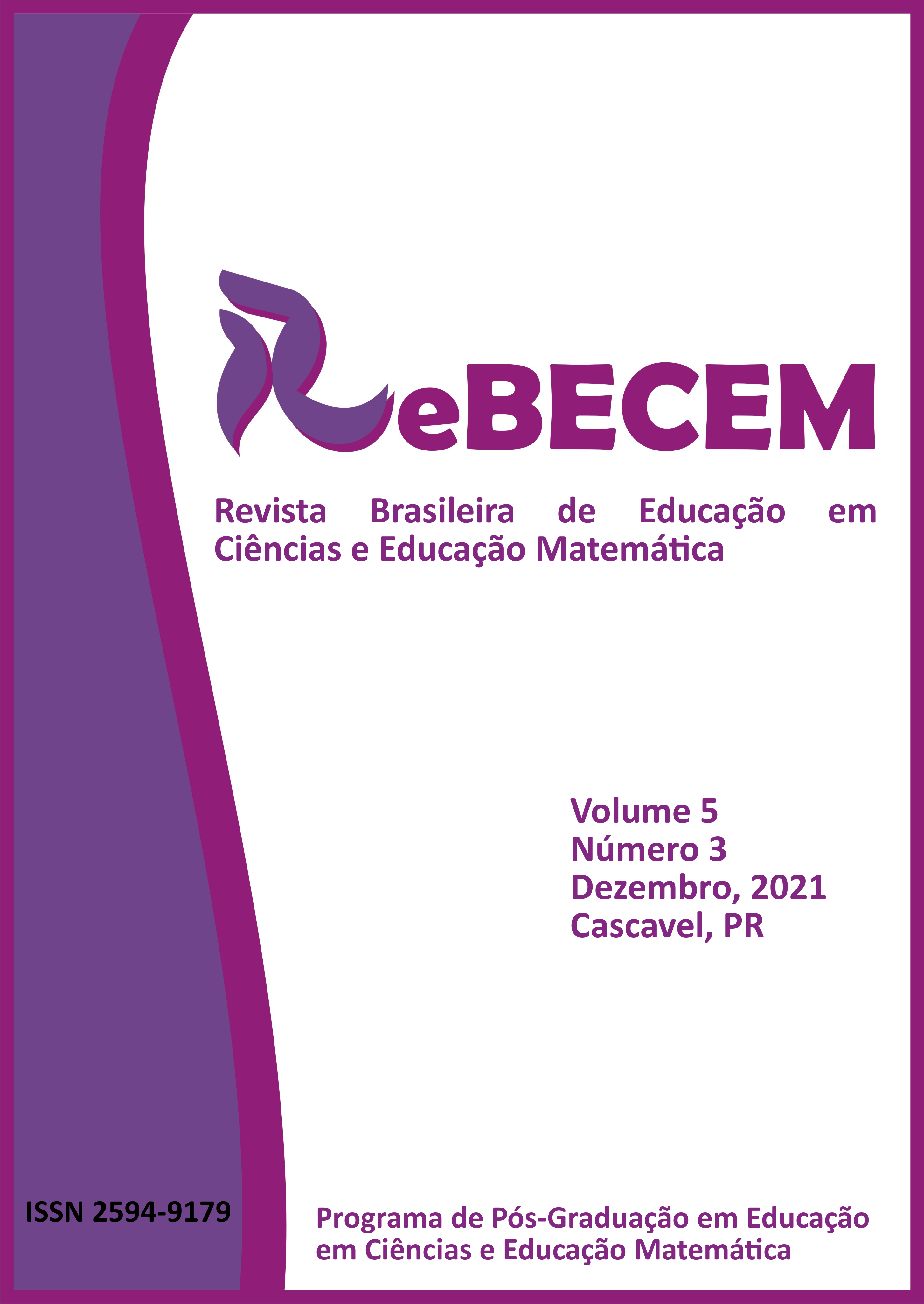A study on the common national curriculum base (CNCB) from the theoretical assumptions of the approach science-technology-society-environment (STSE)
DOI:
https://doi.org/10.33238/ReBECEM.2021.v.5.n.3.28509Abstract
BNCC High School, approved in 2018 by the Ministry of Education, presupposes the reorganization of the curriculum and work methodologies of teachers. To answer whether "The Area of Natural Sciences and its Technologies, present at the CNCB, brings in its assumptions indications that meet an education based on the STSE approach?"This qualitative research used content analysis of materials to show how the STSE approach is contextualized in literature aimed at the teaching of Physics in High School, check the contribution of CNCB to the learning of Physics, and analyze how the CNCB relates aspects of STSE to the Teaching of Physics. With the study, it became clear that the CNCB document has minimal curriculum content, leaving the freedom of choice to the teacher at the school. Similarities between the CNCD assumptions and the STSE approach can be seen.
Downloads
References
AGUIAR, M. A. S. Reformas conservadoras e a “nova educação”: orientações hegemônicas no MEC e no CNE. Educação & Sociedade, Campinas, v. 40, s.n., p. 1-24, 2019.
AIKENHEAD, G. S. What is STS science teaching? In: SOLOMON, J.; AIKENHEAD, G. (Orgs.). STS education: international perspectives on reform. New York: Teachers College Press, 1994. p. 47- 59
AULER, D.; DELIZOICOV, D. Alfabetização científico-tecnológica para quê? Ensaio: Pesquisa em Educação em Ciências, Belo Horizonte, v. 3, n. 1, p. 105-115, 2001.
BRASIL. Ministério da Educação. Base Nacional Comum Curricular. Brasília, 2018. Disponível em: http:/basenacionalcomum.mec.gov.br/>. Acesso em 19 ago. 2021.
BRASIL. Ministério da Educação. Parâmetros Curriculares Nacionais. Brasília, 1997. Disponível em: http:/portal.mec.gov.br/seb/arquivos/pdf/livro01.pdf>. Acesso em 19 ago. 2021.
BRASIL. Ministério da Educação. Parâmetros Curriculares Nacionais Ensino Médio. Brasília, 2000. Disponível em: http:/portal.mec.gov.br/seb/arquivos/pdf/blegais.pdf >. Acesso em 26 set. 2021.
DEMO, P. Pesquisa: princípio científico e educativo. 12ª. ed. São Paulo: Cortez, 2006.
LAKATOS, E. M.; MARCONI, M. A. Metodologia Científica. 5ª. ed. São Paulo: Atlas, 2003.
MINAYO, M. C. S.; DESLANDES, S. F.; GOMES, R. Pesquisa Social: Teoria, método e criatividade. 25ª. ed. Petrópolis: Vozes, 2007.
PERRENOUD, P. Avaliação da excelência à regulação das aprendizagens: entre duas lógicas. Porto Alegre: Artmed, 1999.
RAMOS, M. N. Pedagogia das competências. In: Pereira, I. B. LIMA, J. C. F. (Org.) Dicionário da Educação Profissional em Saúde, Fundação Oswaldo Cruz. Escola Politécnica de Saúde Joaquim Venâncio. Manguinhos / RJ. rev. ampl. 2009. S.p. Disponível em: http://www.sites.epsjv.fiocruz.br/dicionario/verbetes/pedcom.html. Acesso em: 26 ago. 2021.
SANTOS, W. L. P.; MORTIMER, E. F. Uma análise de pressupostos teóricos da abordagem CTS no contexto da Educação Brasileira. Ensaio -Pesquisa em Educação em Ciências, Belo Horizonte, v. 02, n. 02, 110–132, dez, 2002.
SANTOS, W. L. P. Educação CTS e cidadania: confluências e diferenças. Revista de educação em ciências e matemática, Belém, v. 9, n. 17, p. 49-62, jul, 2012 / dez, 2012.
SANTOS, R. A. Busca de uma participação social para além da avaliação de impactos da ciência-tecnologia na sociedade: sinalizações de práticas educativas CTS. 2016, 205f. Tese (Doutorado em Educação) - Universidade Federal de Santa Maria, Santa Maria, 2016.
SILVEIRA, D. T.; CÓRDOVA, F. P. A pesquisa científica. In: Gerhardt, Tatiana Engel. SILVEIRA, Denise Tolfo. Métodos de pesquisa. – UAB/UFRGS – SEAD/UFRGS. – Porto Alegre: Editora da UFRGS, 2009.p. 31 – 42.
STRIEDER, R. B.; KAWAMURA, M. R. D. Educação CTS: Parâmetros e Propósitos Brasileiros. Alexandria, Florianópolis, v.10, n.1, p. 27-56, mai, 2017.
Downloads
Published
How to Cite
Issue
Section
License
Autores que publicam nesta revista concordam com os seguintes termos:
1. Autores mantém os direitos autorais e concedem à revista o direito de primeira publicação, com o trabalho simultaneamente licenciado sob a Licença Creative Commons Attribution que permite o compartilhamento do trabalho com reconhecimento da autoria e publicação inicial nesta revista.2. Autores têm autorização para assumir contratos adicionais separadamente, para distribuição não-exclusiva da versão do trabalho publicada nesta revista (ex.: publicar em repositório institucional ou como capítulo de livro), com reconhecimento de autoria e publicação inicial nesta revista.
3. Autores têm permissão e são estimulados a publicar e distribuir seu trabalho online (ex.: em repositórios institucionais ou na sua página pessoal) a qualquer ponto antes ou durante o processo editorial, já que isso pode gerar alterações produtivas, bem como aumentar o impacto e a citação do trabalho publicado (Veja O Efeito do Acesso Livre).
Licença Creative Commons
Esta obra está licenciada com uma Licença Creative Commons Atribuição-NãoComercial-CompartilhaIgual 4.0 Internacional, o que permite compartilhar, copiar, distribuir, exibir, reproduzir, a totalidade ou partes desde que não tenha objetivo comercial e sejam citados os autores e a fonte.













